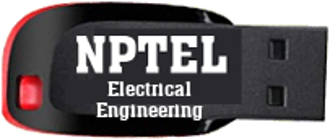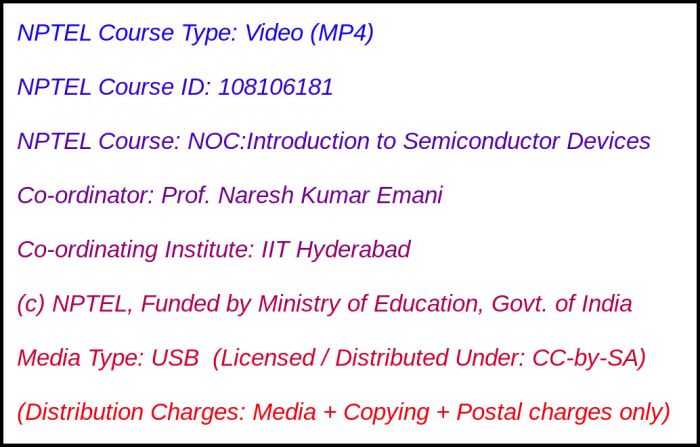
Media Storage Type : 32 GB USB Stick
NPTEL Subject Matter Expert : Prof. Naresh Kumar Emani
NPTEL Co-ordinating Institute : IIT Hyderabad
NPTEL Lecture Count : 78
NPTEL Course Size : 5.6 GB
NPTEL PDF Text Transcription : Available and Included
NPTEL Subtitle Transcription : Available and Included (SRT)
Lecture Titles:
Lecture 1 - Types of Semiconductors
Lecture 2 - Classical Vs Quantum Mechanics
Lecture 3 - Electrons in infinite and finite 1D potential well
Lecture 4 - 3D potential well model of atom and Bohr's model
Lecture 5 - Covalent bonds and inter-atomic interactions in Silicon
Lecture 6 - Energy band formation
Lecture 7 - Electron hole pair generation
Lecture 8 - Direct and Indirect bandgap semiconductors
Lecture 9 - Energy levels in infinite and finite potential wells (short demo)
Lecture 10 - Effective mass in Semiconductors
Lecture 11 - Intrinsic carrier density
Lecture 12 - Doping and extrinsic semiconductors
Lecture 13 - Fermi level in extrinsic semiconductors
Lecture 14 - Temperature dependence of Fermi level
Lecture 15 - Temperature dependence of Fermi level
Lecture 16 - Charge neutrality relationship
Lecture 17 - Drift current and energy band representation of kinetic energy of carriers
Lecture 18 - Semiconductor bands in a electric field
Lecture 19 - Diffusion current
Lecture 20 - Non-uniform doping
Lecture 21 - Equilibrium Vs Nonequilibrium carrier response
Lecture 22 - Minority carrier diffusion equation (MCDE) - Example problems
Lecture 23 - Quasi Fermi level in nonequilibrium conditions
Lecture 24 - Quasi Fermi level and minority carrier diffusion length
Lecture 25 - Semiconductor device fabrication
Lecture 26 - PN Junctions - An introduction
Lecture 27 - PN Junction electrostatics
Lecture 28 - Energy band diagram of PN junction
Lecture 29 - Depletion width and peak electric field
Lecture 30 - PN junction electrostatics - examples
Lecture 31 - Demo of PN Junction Lab on Nanohub
Lecture 32 - Forward and reverse biased PN junctions
Lecture 33 - Minority carrier injection in PN junctions
Lecture 34 - Current in forward biased PN junction
Lecture 35 - Current in reverse biased PN junction
Lecture 36 - Depletion capacitance in PN junction
Lecture 37 - Non-idealities in PN junction diode
Lecture 38 - Nanohub Demo - PN Junction with applied bias
Lecture 39 - Schottky barrier in metal-semiconductor junction
Lecture 40 - Current flow across a Schottky barrier
Lecture 41 - Ohmic vs rectifying contacts
Lecture 42 - An Ideal MOS Capacitor
Lecture 43 - Operating regimes of a MOSCAP
Lecture 44 - Simplified band diagrams of accumulation and depletion in MOSCAP
Lecture 45 - Inversion in a MOSCAP
Lecture 46 - NMOSCAP in accumulation mode
Lecture 47 - NMOSCAP in depletion mode
Lecture 48 - NMOSCAP in inversion mode
Lecture 49 - Exact solution vs delta-depletion approximation
Lecture 50 - Threshold voltage in a MOSCAP
Lecture 51 - Nanohub Demo - MOSCAP tool
Lecture 52 - Non-ideal MOS Capacitor
Lecture 53 - MOSCAP Capacitance-Voltage (CV) Characteristics
Lecture 54 - Example problems with MOSCAPs
Lecture 55 - Impact of doping, oxide thickness and temperature on CV
Lecture 56 - Nanohub Demo - MOS CV
Lecture 57 - Introduction to MOSFET
Lecture 58 - Operating modes of a MOSFET
Lecture 59 - IV Characteristics of a long channel MOSFET
Lecture 60 - Example problems with MOSFETs
Lecture 61 - MOSFET device metrics
Lecture 62 - CMOS Technology
Lecture 63 - MOSFET Scaling and technology nodes
Lecture 64 - Limits of scaling
Lecture 65 - Current characteristics of a short channel MOSFET
Lecture 66 - Threshold voltage characteristics of short channel MOSFET
Lecture 67 - MOSFETs in the 21st century
Lecture 68 - Optical absorption and bandgap
Lecture 69 - Introduction to solar cells
Lecture 70 - Efficiency of a solar cell
Lecture 71 - Types of photodetectors
Lecture 72 - PIN and avalanche Photodectectors
Lecture 73 - Photodetector metrics
Lecture 74 - Radiative absoption and emission processes
Lecture 75 - Materials for optoelectronic devices
Lecture 76 - Operation of a light emitting diode (LED)
Lecture 77 - LED emission spectrum
Lecture 78 - Stimulated emission and lasing

